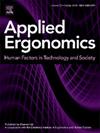Advancing sociotechnical systems theory: New principles for human-robot team design and development
IF 3.4
2区 工程技术
Q2 ENGINEERING, INDUSTRIAL
引用次数: 0
Abstract
This paper reviews and adapts sociotechnical systems (STS) principles for the design and development of Human-Robot Teams (HRTs). Through a collaborative review process, the authors identify existing STS principles relevant to HRTs, suggest modifications, and introduce new ones to address the unique challenges of designing and developing human-robot teams. A framework of 34 STS principles grouped into seven themes is presented: Systems Design and Adaptation, Human-centered Approach, Integration and Optimization, Collaboration and Participation, Information and Communication, Organizational Alignment and Process Management, and Trust and Reliability. To address the dynamic nature of HRTs incorporating mutual understanding between humans and intelligent robots, eight new principles are introduced: Adaptive Autonomy, Agility and Responsiveness (future thinking), Cognitive Workload Management, Ethical Considerations, Transparency and Explainability, Collaborative Sensemaking, Trustworthiness and Unpredictability Management.
This STS framework bridges traditional STS theory and AI-enhanced HRTs, guiding developers in creating effective, trustworthy, and ethical HRTs. The paper benefits researchers, developers, and organizations by addressing sociotechnical complexities and upholding a more balanced, ethical, and human-centered collaboration in HRT development.
推进社会技术系统理论:人机团队设计和开发的新原则
本文回顾并将社会技术系统(STS)原理应用于人-机器人团队(hrt)的设计和开发。通过协作审查过程,作者确定了与hrt相关的现有STS原则,提出了修改建议,并引入了新的原则,以解决设计和开发人机团队的独特挑战。提出了一个由34个STS原则组成的框架,分为7个主题:系统设计和适应、以人为本的方法、集成和优化、协作和参与、信息和通信、组织协调和过程管理、信任和可靠性。为了解决hrt的动态性,包括人类和智能机器人之间的相互理解,引入了八项新原则:自适应自治、敏捷性和响应性(未来思维)、认知工作量管理、道德考虑、透明度和可解释性、协作意义制造、可信度和不可预测性管理。这个STS框架将传统的STS理论和人工智能增强的hrt结合起来,指导开发人员创建有效、可信和合乎道德的hrt。这篇论文通过解决社会技术的复杂性,并在HRT开发中维护一个更加平衡、道德和以人为中心的协作,使研究人员、开发人员和组织受益。
本文章由计算机程序翻译,如有差异,请以英文原文为准。
求助全文
约1分钟内获得全文
求助全文
来源期刊

Applied Ergonomics
工程技术-工程:工业
CiteScore
7.50
自引率
9.40%
发文量
248
审稿时长
53 days
期刊介绍:
Applied Ergonomics is aimed at ergonomists and all those interested in applying ergonomics/human factors in the design, planning and management of technical and social systems at work or leisure. Readership is truly international with subscribers in over 50 countries. Professionals for whom Applied Ergonomics is of interest include: ergonomists, designers, industrial engineers, health and safety specialists, systems engineers, design engineers, organizational psychologists, occupational health specialists and human-computer interaction specialists.
 求助内容:
求助内容: 应助结果提醒方式:
应助结果提醒方式:


